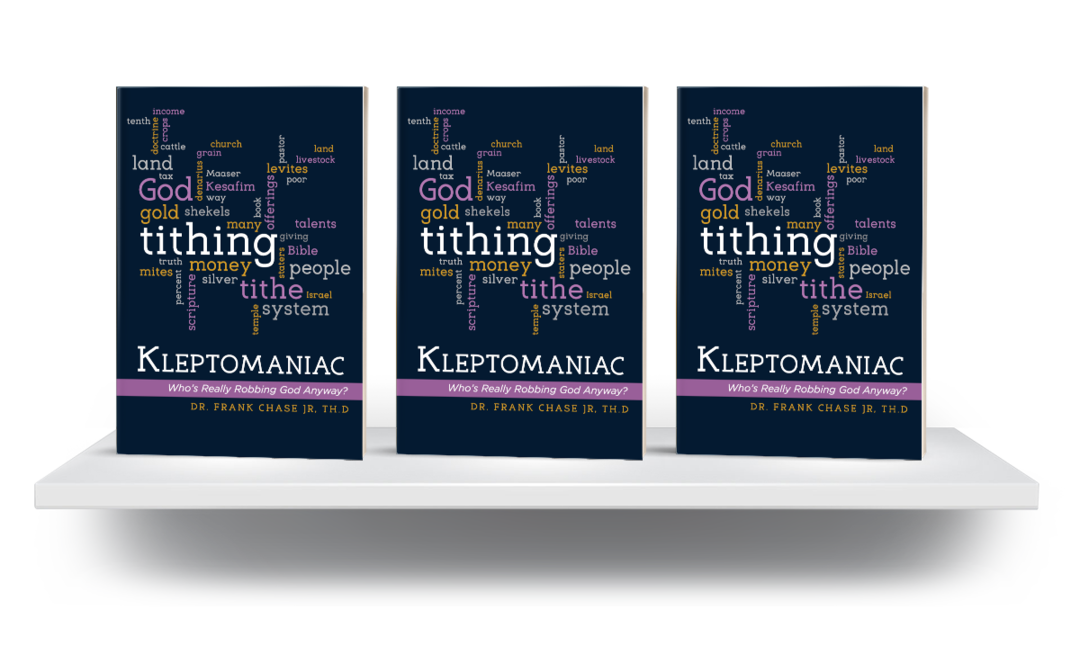 Get Your Copy Now!
Get Your Copy Now!
Go book
For many people, taking a test can be nerve racking. It gets even more complicated when you start asking questions about biblical subjects such as tithing. Over the years, I’ve heard many people talk about tithing from a matter-of-fact perspective, only to discover that the facts they thought were correct amounted to nothing but error and mis-information.
It is strange that when questions arise as to what tithing is, it never ceases to amaze me how the collective religious flash mob responds and says, tithing is your talent, time or money without one single biblical verse to back up their definition. If you present another perspective that challenges their tithing definition assumptions, it can send people into immediate cognitive dissonance. In this blog post, I will give a list of tithe questions and answers so that readers can begin the journey to seek the truth about what God required as a tithe and to whom the tithe was paid to. Of course the answers will not be exhaustive but will start you on a path to discovery for deeper meaning.
When discussing tithing, it must be understood that no matter what you believe, biblical context drives how one should view tithing. In the Bible, agricultural (produce), herd and flock tithes were eaten by the people, given to Levites, shared during the yearly triennial feast and the Levites paid a tenth part of the eatible tithe to the high priest by Abram to Melchezedec once
Tithe Test Questions and Answers
- What is the biblical definition of the tithe? Answer: The word tithe in Hebrew means ma’asar. The literal meaning refers to a tenth part but has no relationship to offering, gift or sacrifice. The tithe based on scripture is narrowly defined as agricultural increase from the land and every tenth animal from herds and flocks according to Lev: 27:30, 32, tithe from …“seed of the land… fruit of the tree …herd or of the flock.”
- What is the secular non-biblical definition of the tithe? Answer: The non-biblical definition of the tithe is defined as ten percent from either gross or net income or pay which is paid to support religious institutions or to pastors as a salary. Malachi 3:8-10 is used out of context as the basis for justifying monetary tithing. There is no scripture to support monetary tithing in the church.
- Who paid tithes in the Old Testament? Answer: According to Hebrews 7:5, 11, the people [tribes of Israel] who were land owners farmers and herders paid the tithe to the Levites who were commanded by God and the Law to collect tithes. Numbers 18:25 says God Commanded Moses to tell the Levites to take tithes from the children of Israel who grew crops, and raised cattle [the 11 tribes].
- Who received tithes in the Old Testament? Answer: If it is not a foregone conclusion that only Levites by bloodline received the tithes in Israel as an inheritance, then let’s make it clear using scripture. God said, “And, behold, I have given the children of Levi [levites] all the tenth [tithes] in Israel for an inheritance, for their service which they serve, even the service of the tabernacle of the congregation” (Numbers 18:21).
- What was the contents of the tithe and was money tithed? Answer: The answer to the latter part of the question is no. Money could not be tithed because the law never required it. The tithe in Israel consisted of grains, fruits, wine, oil, corn, nuts, herds and flocks. The only time money is associated with tithing is when the tithe was too much to carry to the temple, it was turned into money and spent on purchasing eatable items such oxen, sheep, wine, strong drink and it was consumed by the tither and shared with the Levites (Leviticus 27:30-33, Duet. 12:17, 14:22-23).
- Jesus was required to pay tithes? True or False. Answer: The answer is false because Jesus was neither a farmer or herder in Nazareth. In fact, he and his father was carpenters and would not have paid tithes from their salary because only crops and cattle were on only accepted by the temple as tithes. It is well established that Jesus paid temple taxes because he told his disciples to take money out of the mouth of a fish and pay the temple tax.
- Did Abram pay tithes from his wealth? True or false? The answer is false because Abram received some of his wealth and was made rich in Egypt by getting wealth from Pharaoh (Genesis 13:2) long before the law was established. Abram never paid a tithe from his cattle, silver or gold to Melchizedek. The one-time tithe Abram paid once happened when he was 80-years-old and came from other people’s goods he confiscated on the battlefield. And Hebrews 7:4 is says, “4 Now consider how great this man was, unto whom even the patriarch Abraham gave the tenth of the spoils.” It is clear from scripture that Abram took a tithe from spoils of war and give it to Melchizedek.
- What occupations in Israel did not pay tithes? Answer: There are many occupations that did not pay tithes in the Bible, such as artists, carpenters, blacksmiths, boatbuilders, bakers, potters, fruit pickers, doctors and fishermen, which was the occupation of all the disciples. Priests, tax collectors, tent makers, which was Paul’s occupation did not pay tithes. However it is important to note that poor people did not tithe but were recipients of the tithe and if a hired field laborer worked the field to harvest the crop tithe, or worked with the herd and flock tithe and received pay; that pay was not tithed because it was earned income from working in the animal and crop husbandry industry.
- A tithe can come from money, time, talent or anything? True or False? This is false based on the definition of the tithe. You cannot substitute what God requires a tithe to financially support the institutional church using out-of-context scriptural interpretation.
- Were the tithes in Israel always brought to the temple storehouses in Jerusalem? True or False? The answer is false because tithes were also brought to the levitical cities where Levites lived. The Bible is clear on this in Numbers 35:2-4, “2 Command the children of Israel, that they give unto the Levites of the inheritance of their possession cities to dwell in; and ye shall give also unto the Levites suburbs for the cities round about them. 3 And the cities shall they have to dwell in; and the suburbs of them shall be for their cattle, and for their goods, and for all their beasts. 4 And the suburbs of the cities, which ye shall give unto the Levites, shall reach from the wall of the city and outward a thousand cubits round about.”
- First fruits and tithing are interchangeable because they are both money? The answer is patently false. Tithing emphasized quantity because it was a tenth part of the crops and every tenth animal. The tithe consisted of bulk. First fruits and tithes are only similar in that they are both eatible. On the other hand, first fruits emphasized quality. First fruits came from what grew out of the ground first and it was placed in a basket like it says in Duet. 26:2 “2 That thou shalt take of the first of all the fruit of the earth, which thou shalt bring of thy land that the LORD thy God giveth thee, and shalt put it in a basket, and shalt go unto the place which the LORD thy God shall choose to place his name there.” It should also be noted items were small enough to be placed in the basket as first fruits and the list is, grapes/wine, barley, wheat, figs, olives/oil, honey, pomegranates. Check out Duet. 18:4, “4 The firstfruit also of thy corn, of thy wine, and of thine oil, and the first of the fleece of thy sheep, shalt thou give him.” Based on these two verses alone, it clear tithes and first fruits are completely different quality and quantity. So it is clear money is not biblically a first fruit.
- Tithing in the law took place every year without a break? True or False? This answer is false once again. Because we are dealing with an agrarian theocracy, you have to have some knowledge of agricultural cycles. Tithing in Israel was based on planting and harvesting cycles of the sabbatical cycles. It is a known biblical fact that for six years they sowed in the fields but on the seventh year there was no tithing. If we hypothesize that tithing was money, although it is not, why do churches not follow the law and suspend tithing every seventh year?
- A true understand of tithing in the New Testament can be gleaned from Apostle Paul who wrote so much about giving and never mentioned tithing anywhere in the New Testament. The questions everyone must ask is why. So check out Paul’s view on tithing and giving in this book bubble: https://bublish.com/bubble/stream/18922

https://authoruproar.com/author-frank-chase-jr/
There are many questions that can be asked about tithing and all the answers are in the Bible. It just takes a little study and research to discover the facts. Being duped by scriptural shell games only hurts those who fall for the monetary tithe that’s not contain on the page of the Hold Scriptures. No matter how much you post and explain that the New Testament does not command monetary tithing, some people never accept this truth, but hang onto to the notion that if they don’t tithe, churches all over the country won’t be able to pay its bills and thus will have to close. Many people have vested interests in their places of worship. The building is a fixture that’s been etched into the psyche of all believers. The fear that a building could be lost due to a lack of tithing money is a powerful drug to maintain the cashflow. The indoctrination into monetary tithing has centuries-old roots. And to undue ingrained beliefs about mandatory payments of ten percent will not stop just by writing a book that dispels tithing myths. Other strongholds such as fears of God cursing people who don’t tithe or hopes of receiving abundant blessings for paying God his tithe money keeps the truth about tithing sequestered in the religious mind. Sometimes I still can get over that fact that it took me 30 years to find the truth about tithing. Can you imagine the millions of believers who died never knowing the truth about tithing and may have never taken care of their family properly all because they felt compelled to tithe even when they didn’t have the money.
Kleptomaniac Book Excerpt

http://seriousreading.com/book-reviews/education-teaching/20967-kleptomaniac-whos-really-robbing-god-anyway-the-untwisted-truth-about-the-centuries-old-tithes-and-offering-deception.html?fbclid=IwAR0pnMKD9qWli20u7xEmnVWYzc12XxWWp8mnv6uSKh4nXfGiBIEqkMiSnr8
“If there is one truth anyone should take away from this revealing expose is that the tithing system that exists today in modern Christianity was not birthed in the Bible but was inherited from the Middle Ages in Catholicism when the Catholic Church ruled Christianity and perhaps the entire world. Their published documents such as the New Catholic Encyclopedia admits to creating the new tithe out of thin air. Here is what the record says, “The early Church had no tithing system. The tithes of the Old Testament were regarded as abrogated by the law of Christ…But as the church expanded and its material needs grew more numerous and complex, it became necessary to adopt a definite rule to which people could be held either by as sense of moral obligation or by a precept of positive law. The tithing of the Old Law provided an obvious model, and it began to be taught…The council of Macon in 585 ordered payment of tithes and threatened excommunication to those who refused to comply.”
There you have it! “It was the Roman Catholic Church in 585, which forced tithing on Christians. They instituted this law for all Catholics to follow and if they disobeyed, they could face excommunication. In reality, the state police, sheriff, and legal authorities were often used to forcibly ‘collect’ and estimated ‘tithe’ from the recalcitrant parishioners in Ireland and throughout Europe. The tithing law was religiously enforced on the people whether they wanted to or not. Excommunication, of course, was a very serious penalty. It could mean a loss of a job, loss of income, ostracism by the community and former friends, and loss of land, houses, and possessions. It could even lead to charges of heresy, and imprisonment or death.” Excerpt From: Dr. Frank Chase, Jr., Th.D. “Kleptomaniac.” iBooks. https://store.bookbaby.com/book/kleptomaniac
SaveSave
Get Kleptomaniac: Who’s Really Robbing God Anyway? on your iPad: Kleptomaniac – Frank Chase Jr






Recent Comments